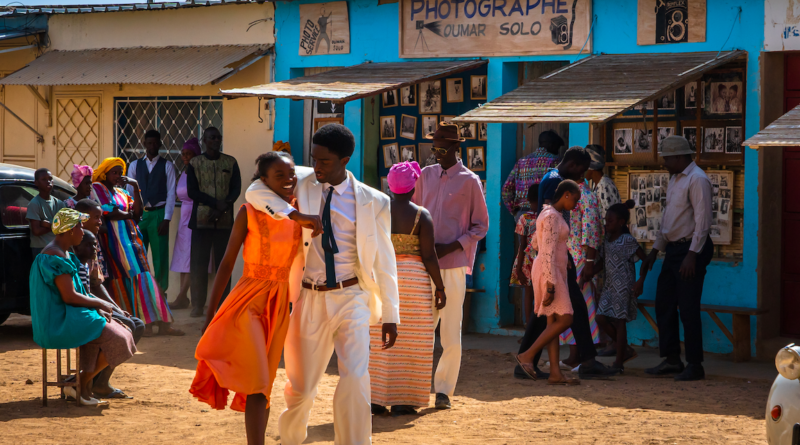INTERVIEW: Music (and political change) are in the air in 1960s Bamako
Photo: Dancing the Twist in Bamako stars Alice Da Luz and Stéphane Bak. Photo courtesy of Artmattan Films / Provided by Film Forum press site with permission.
The time: the 1960s.
The location: Bamako, the capital of Mali, only recently independent from French colonial rule.
The premise: love, music, justice.
Dancing the Twist in Bamako, which is currently playing at New York City’s Film Forum, follows the character of Samba (Stéphane Bak), a young idealist and socialist who is hopeful for his country in these uncertain times, according to press notes. He is dating Lara (Alice Da Luz), and both of them work hard during the day to see what the 1960s have in store for their shared trajectory. By night, they enjoy dancing to the tuneful rhythms of American singers and bands, including Otis Redding, the Supremes and the Beach Boys.
Director Robert Guédiguian, who co-wrote the film with Gilles Taurand, was heavily influenced by the photography of Malick Sidibé, the Malian photographer who captured this time period in the country’s history. The images in the film can be directly tied to Sidibé’s own imagery, telling of transformation and yearning, independence and insight, fun and energy.
Recently Hollywood Soapbox exchanged emails with Guédiguian, known for Gloria Mundi, Don’t Tell Me the Boy Was Mad and Ariane’s Thread. Questions and answers have been slightly edited for style. Answers are provided in French and English.
How did photographer Malick Sidibé’s photography inspire the screenplay?
Le regard de Sidibé nous montre la vitalité,la joie,la sensualité,le plaisir de la jeunesse malienne dans ces années là.
Sidibé’s gaze shows us the vitality, joy, sensuality, pleasure of Malian youth in those years.
From what you learned, what were the 1960s like in Mali?
C’est une fête révolutionnaire, un grand moment d’émancipation à travers la décolonisation et le rêve d’une société plus juste … une volonté de partage des richesses et d’épanouissement individuel pour les hommes et pour les femmes.
It’s a revolutionary celebration, a great moment of emancipation through decolonization and the dream of a society more just … a desire for shared wealth and individual fulfillment for men and women.
How does a story set 60 years ago have commentary on today’s society?
La question de la justice sociale et du partage des richesses continuent à se poser aujourd’hui en Afrique mais aussi dans le monde de manière de plus en plus grave..il faut être attentif à toutes les tentatives de réponse qui ont eu lieu et examiner pourquoi elles n’ont pas duré.
The question of social justice and the sharing of wealth is still relevant today in Africa but also in the world in an increasingly serious way. We must be attentive to all the attempts to find solutions that have taken place and examine why these solutions didn’t last.
How would you describe Samba and Lara as characters?
Samba représente un révolutionnaire conscient. Lara est révolutionnaire sans le savoir. En cela leur rencontre est un coup de foudre.
Samba represents a conscious revolutionary. Lara is a revolutionary without knowing it. As a result their meeting leads to love at first sight.
How are the personal and political intertwined in this story?
J’étais comme Samba quand j’avais son âge … idéaliste, bon danseur et motard. Je voulais aussi montrer l’universalité de ce moment africain … et ainsi montrer qu’il y a de l’universel partout où il y a de l’humanité
I was like Samba when I was his age … idealist, a good dancer and a biker. I also wanted to show the universality of this African moment … and thus show that there is universality wherever there is humanity.
What’s it like collaborating with Gilles Taurand?
J’aime travailler avec Gilles sur les sujets historiques car il ne sépare pas les approches intellectuelles des approches sensibles … ce que je ne supporte pas.
I like working with Gilles on historical subjects because he doesn’t separate intellectual approaches from sensitive approaches … something I can’t stand.
By John Soltes / Publisher / John@HollywoodSoapbox.com
Dancing the Twist in Bamako, co-written and directed by Robert Guédiguian, is currently playing at New York City’s Film Forum. Click here for more information and tickets.

